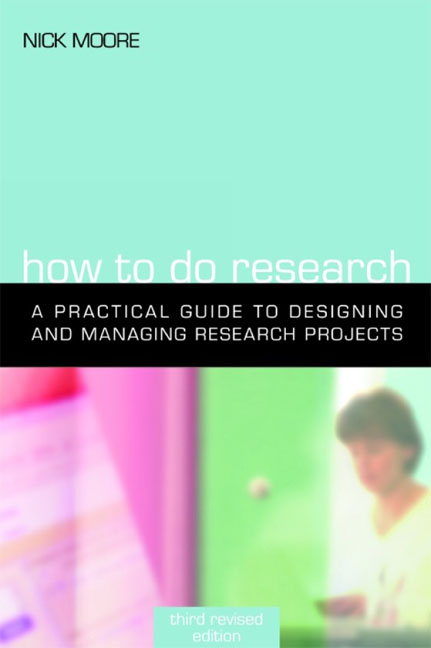Book contents
- Frontmatter
- Contents
- Acknowledgements
- Introduction: Types of research
- Part 1 The research process
- 1 Develop the research objectives
- 2 Design and plan the study
- 3 Write the proposal
- 4 Obtain financial support for the research
- 5 Manage the research
- 6 Draw conclusions and make recommendations
- 7 Write the report
- 8 Disseminate the results
- Part 2 Methods
- Appendix The market for information professionals: A proposal from the Policy Studies Institute
- Index
2 - Design and plan the study
from Part 1 - The research process
Published online by Cambridge University Press: 09 June 2018
- Frontmatter
- Contents
- Acknowledgements
- Introduction: Types of research
- Part 1 The research process
- 1 Develop the research objectives
- 2 Design and plan the study
- 3 Write the proposal
- 4 Obtain financial support for the research
- 5 Manage the research
- 6 Draw conclusions and make recommendations
- 7 Write the report
- 8 Disseminate the results
- Part 2 Methods
- Appendix The market for information professionals: A proposal from the Policy Studies Institute
- Index
Summary
The overall shape of the project will be determined to a large extent by the aim and objectives. In the example of research into training and organizational change, a decision had to be made early on about whether to use a before-andafter approach or one that relied on comparisons between organizations. And so it is with most projects. Even though the overall shape may be fixed by factors outside your control, there is still much to be done to design and plan the study in detail.
Resource constraints
First it is necessary to be aware of the constraints on the resources available to you. Essentially you need to think about money, time and expertise. Each is equally important.
Money
The overall amount of money available will play a large part in determining the design of the research. If you are being contracted by an organization to carry out work on their behalf, you clearly have to work within the budget they set. Research is a labour-intensive process and so most of this budget will be taken up by staff costs. Basically, the amount of money available dictates the number of days that can be spent on the project and thus determines its overall size.
If the research is part of your job within an organization there is usually a less stringent financial constraint. Most of the staff costs are likely to be covered, unless it is necessary to employ additional researchers, and the budget will be used for incidental expenses like the costs of conducting a survey. However, financial resources are never unlimited and before settling on the design you should check that money is available to spend on the research.
At the other end of the scale, if you are a student, it will probably be a case of considering whether or not you can afford the postage, copying and stationery costs associated with undertaking a postal survey.
Time
Here you need to think about two different sorts of time: elapsed time and research days. Elapsed time is simply the time between the start and finish of a project. For a student, the deadline is the submission date for the dissertation. On a research contract there will almost certainly be an equally severe cut-off point. In-house researchers may have their deadline set by something like the date of a board meeting.
- Type
- Chapter
- Information
- How to Do ResearchA practical guide to designing and managing research projects, pp. 10 - 29Publisher: FacetPrint publication year: 2006



